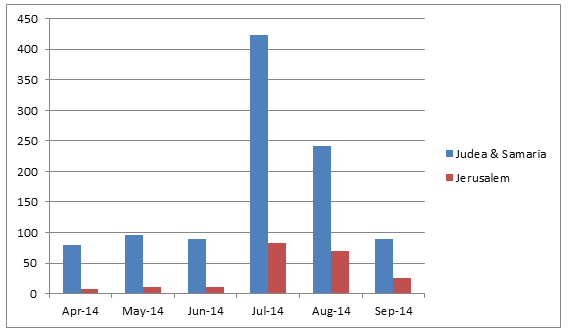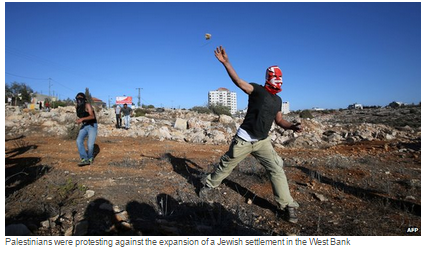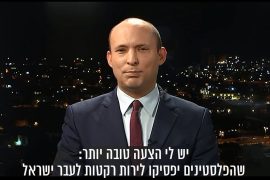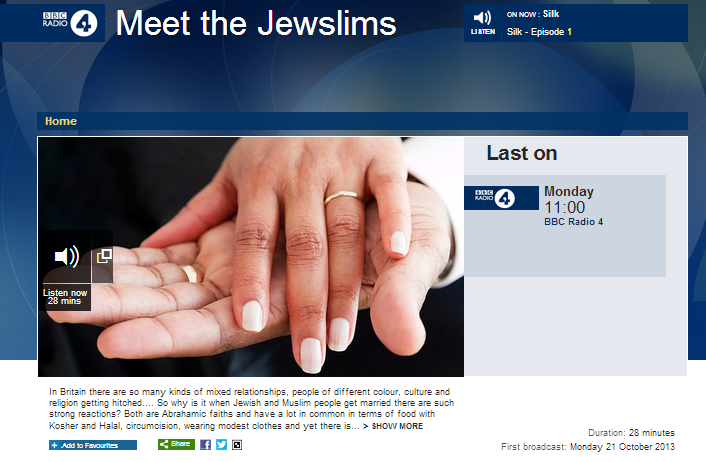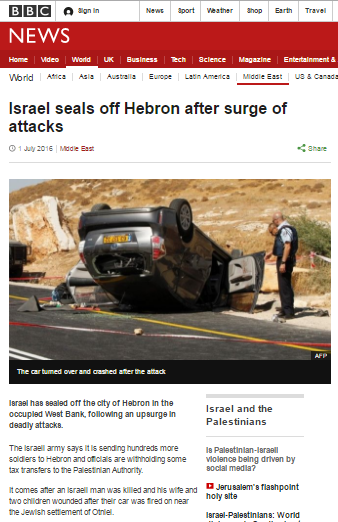On October 25th the BBC News website’s Middle East page ran an article titled “US urges probe after teenager shot dead in West Bank“. Apparently based at least in part on a report appearing in Ha’aretz, the article informs readers that: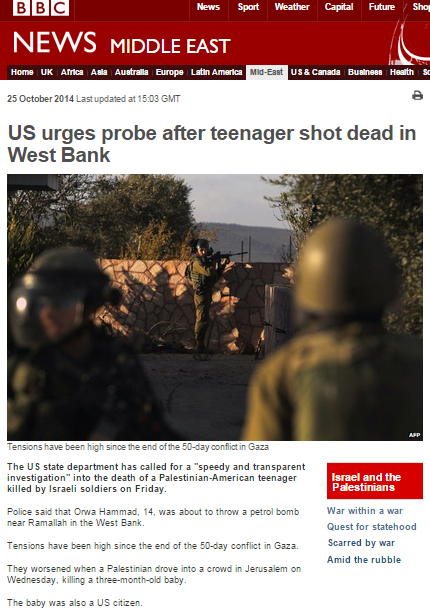
“The US state department has called for a “speedy and transparent investigation” into the death of a Palestinian-American teenager killed by Israeli soldiers on Friday.
Police said that Orwa Hammad, 14, was about to throw a petrol bomb near Ramallah in the West Bank. […]
A relative identified the teenager as Orwa Abd al-Wahhab Hammad, who was born in New Orleans and came to the West Bank when he was six, Israeli newspaper Haaretz reported.”
Other media reports (quoting Palestinian media outlets and Palestinian officials) have described the youth as being sixteen or seventeen years old.
With regard to the circumstances of the incident, in addition describing its location as “near Ramallah”, the BBC informs its audiences that:
“He [Hammad] was reported to have been shot in the head during clashes between IDF soldiers and stone-throwing protesters.
Some of the protesters were seen making and throwing Molotov cocktails.
An IDF spokesman initially told Reuters that forces “managed to prevent an attack when they encountered a Palestinian man hurling a Molotov cocktail at them on the main road. They opened fire and confirmed a hit.” “
In the caption to one of the photographs used to illustrate the report, readers are also told that:
“Molotov cocktails and stones were thrown at Israeli jeeps and soldiers in Silwad, near Ramallah”
So where did the incident occur and what actually happened? Channel 10 News reported as follows:
“According to an announcement by the IDF Spokesman, at around 19:00 hours a unit of the parachute regiment engaged in operational activity between the village of Silwad and Route 60 in the Ramallah area identified a Palestinian throwing petrol bombs in the direction of the road upon which Israeli vehicles were travelling.”
Walla reported:
“A Palestinian youth was killed yesterday (Friday) by fire from an IDF unit which was in an ambush in the village of Silwad, north-east of Ramallah, after the unit identified him throwing a petrol bomb at Route 60 and opened fire.”
The Jerusalem Post reported:
“A Palestinian was shot dead by IDF troops outside the village of Silwad in the West Bank on Friday evening, after he threw a Molotov cocktail at traffic on highway 60, the IDF Spokesperson’s Department said.
The IDF said that the soldiers were on patrol in the area and had set up an ambush overlooking the stretch of highway when they saw the assailant throw the bottle.
They said that the soldiers opened fire “in order to neutralize the threat to the lives of civilians driving on the highway.” “
In other words, the incident did not take place “near Ramallah” as stated by the BBC, but some fifteen and a half kilometers away outside Silwad on a main highway used by both Israeli and Palestinian motorists. Additionally, it is likely that civilian motorists were the target of Hammad’s petrol bomb rather than – as suggested by the BBC – IDF forces, with the BBC’s claim that Hammad was shot “during clashes between IDF soldiers and stone-throwing protesters” not being supported by other media reports.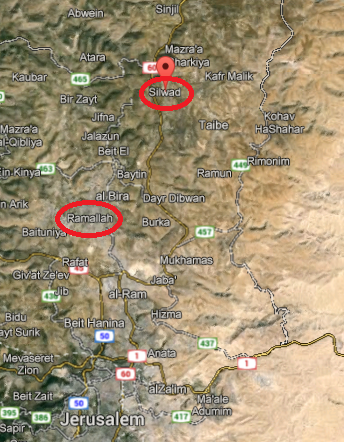
Like the US State Department, the BBC is apparently not overly interested in investigating why a US citizen was throwing petrol bombs at motorists on a main highway.
Notably too, this report misleads readers with the following statement, which appears both as a caption to an illustrative photo and in the body of the report:
“Tensions have been high since the end of the 50-day conflict in Gaza.”
Later on, a seemingly contradictory statement is presented:
“Although a fragile ceasefire has been holding since the end of the 50-day conflict between Israel and Palestinians in Gaza, incidents of violence have continued sporadically throughout the West Bank and near holy sites in Jerusalem.”
Of course the ceasefire which brought this summer’s conflict in Israel and the Gaza Strip (not exclusively “in Gaza” as described by the BBC) between Israel and Hamas (not “Palestinians” as the BBC claims) has absolutely no bearing on the rioting and violent attacks carried out in other areas.
Whilst on the one hand the BBC informs audiences that tensions “have been high” since the ceasefire came into effect, on the other hand it claims that violent incidents have been ‘sporadic’: i.e. “occurring at irregular intervals; having no pattern or order in time“.
So what are the facts behind those two BBC statements?
In fact, according to data collected by the ISA, violent attacks by Palestinians in Judea & Samaria and Jerusalem peaked during July and have since returned to the levels seen prior to Operation Protective Edge. However, it is difficult to see how they can be accurately described as having “continued sporadically” seeing as their occurrence (usually not reported by the BBC) is a daily event.
But the really interesting part of this BBC report is its shoehorning of the topic of ‘settlements’ into its ‘contextualisation’ of Palestinian terror. Despite there being no confirmation of the motives of Orwah Hammad as he lobbed petrol bombs at passing cars, one of the images used to illustrate the report is presented with the following tendentious caption:
“Palestinians were protesting against the expansion of a Jewish settlement in the West Bank”
Relating to the terror attack in Jerusalem on October 22nd, the article later informs readers that:
“Wednesday’s car attack was carried out by a Palestinian man from Silwan in East Jerusalem, where tensions are high among Palestinians who are angry over Jewish settlements in the area.”
Oddly, some might say, the BBC appears to believe that “tensions” and ‘anger’ felt by those who oppose people of a certain ethnicity living in a certain place are a factor which can be used to ‘explain’ both petrol bomb attacks on motorists and the deliberate murder of a three month-old baby.
But are there in fact “Jewish settlements” in the Silwan (Kfar Shiloach) neighbourhood of Jerusalem? Well, not according to the BBC’s own definition of ‘settlements’:
“Settlements are residential areas built by the Israeli government in the territories occupied by Israel following the June 1967 war. They are illegal under international law – that is the position of the UN Security Council. Israel rejects this assertion. ” [emphasis added]
What there is in that neighbourhood of Jerusalem is existing housing purchased and inhabited by some 90 Jewish families (roughly 500 people out of a population of over 50,000). Hence we see that the BBC is herding audiences towards a very dubious narrative which encourages them to view the purchase of property in certain areas of a city by people of a specific faith and ethnicity as “illegal” and undesirable. One has to wonder whether the BBC’s ‘progressive’ approach would extend to encouraging its audiences to view neighbourhoods of mixed religion, ethnicity (and perhaps colour or sexual orientation) in any other city in such a light.
But of course that anachronistic BBC narrative does not appear by chance: it is also the narrative of the Palestinian Authority, the president of which recently introduced new punishments (unreported by the BBC) for those who sell property to Jewish Israelis.
“Palestinian Authority President Mahmoud Abbas on Monday issued an order that would toughen punishment for Palestinians involved in real estate deals with “hostile countries” and their citizens.
Abbas’s decision came following reports that Palestinians have sold houses in Jerusalem’s Silwan neighborhood to Jews. […]
In his order, Abbas decided to amend the Palestinian penal code so that it would include hard labor in addition to life imprisonment for Palestinians who sell, rent out or serve as mediators in real estate transactions with “hostile countries” and their citizens.
In 2010, a PA court reaffirmed that the sale of Palestinian land to Israelis is punishable by death. Although the death sentence has not been officially executed, several Palestinians have been murdered in east Jerusalem and the West Bank over the past four decades after being accused of involvement in property transactions with Jews. ”
Whilst BBC licence fee payers got a hefty dose of PA propaganda in this article, they have clearly not been provided with the accurate, impartial or comprehensive reporting to which the BBC is committed.

